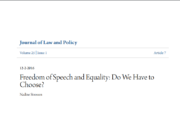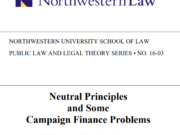New York State recently issued emergency regulations on independent expenditures, changing the definition of what constitutes an independent expenditure so that it now reads like an IRS facts and circumstances test. CCP submitted comments (available here), noting:
Effective May 22, an independent expenditure apparently occurs every time a state regulator says so. The Regulations list some factors to consider in determining whether a communication qualifies as an independent expenditure, but note that those factors are not exhaustive. In addition to the ambiguous wording of the factors themselves—which is self-evident—regulators’ newfound freedom to consider anything they choose in determining whether a communication is an independent expenditure vastly increases the law’s vagueness.
The comments go on to say:
The Supreme Court has long recognized the danger of vesting officials with excessive discretion in determining how far the First Amendment’s protections extend,[13] as “[p]recision of regulation must be the touchstone in an area so closely touching our most precious freedoms.”[14] Even more concerning than this unbridled discretion is the fact that vague laws—particularly in the First Amendment context—chill speech. Thus, such laws have been consistently decried by the Supreme Court, because they put the speaker in these circumstances wholly at the mercy of the varied understanding of his hearers and consequently of whatever inference may be drawn as to his intent and meaning. Such a distinction offers no security for free discussion. In these conditions it blankets with uncertainty whatever may be said. It compels the speaker to hedge and trim.[15]
In other words, “vague laws chill speech” because “[p]eople ‘of common intelligence must necessarily guess at [the law’s] meaning and differ as to its application.’”[16] This cannot be reconciled with the First Amendment’s protection of free expression.
The regulations are set to expire after 90 days, but it is likely that the regulation will become permanent.
The regulations were triggered by a new law that imposes incredibly high paperwork burdens on IE spenders, but the new law did not give a new definition of an IE or require the board to revisit the previous definition.
The new law is available here.
The regulations are available here.
The Center for Competitive Politics’ comments are available here.














